- The dilemma of oversighting the commercial ventures of Nigerian military
- A call to look beyond the veil of Nigerian Military’s welfare and commercial platforms
- Is this a ‘blackhole’ in Nigeria’s security financing?
Editor’s note: There is a paradox today that the more the government spends on the security and defence sector, the more insecure Nigerians feel. This has prompted calls for proper monitoring and tracking of funds allocated to the sector to ensure transparency and accountability, but this has proved difficult due to its opaque nature and lack of the oversight capacities of government officials and Civil Society Organisations (CSOs). However, as more efforts are focused on legislated funds as contained in the annual budget, this special research and investigative report by SENATOR IROEGBU, reveals that most unaccounted funds and corruption cases emanates from extra and off-budgetary funds like security votes and the not much talked about “welfare and commercial ventures” set up by various services of the Nigerian Armed Forces.
Background
The challenges of monitoring and tracking defence budget and security spending in Nigeria, have remained daunting despite some efforts by the stakeholders towards ensuring accountability and transparency in the procurement process and funding of the sector. This is a result of the opaque nature of the sector aided by the dubious use of extra-budgetary allocation and off-budget finances like most commercial ventures set up by various defence and security institutions that are unaccounted for. But before one goes deep into the chronic lack of oversight of the defence and security sector, it would be, however, apt to note that its reforms have become imperative even as Nigeria has in recent times, witnessed an unprecedented level of insecurity. To this end, national security threats have become a major issue for the government with an increased budget for the sectors addressing the worsening spate of insecurity reflected in the prevalent cases of insurgency, banditry, kidnappings, and other crimes across the country.
Unfortunately, Nigeria has continued to witness incessant attacks, loss of lives and property, and other forms of crimes and criminality by bandits, terrorists, militants, and kidnappers, despite the huge budgetary allocations and spending in the defence sector. More worrisome is the fact that the cumulative number of resources devoted to security in Nigeria remains opaque. The funding of the military, which has been increasing year-on-year, especially since the ongoing decade of counter-insurgency operations, is generating heated controversy, especially over who manages the money allocated to the sector as both the Ministry of Defense (MOD) and the Office of the National Security Adviser (ONSA) have repeatedly denied managing the money. It is no longer news, however, that since the war against insurgency started in 2009, there is no year the military did not get a larger chunk of the national budget. It has become a norm that most times, the defence budget is higher than even education or work, essentially because Nigeria values security yet the country has not got quite a good deal in the issues of security.
Accordingly, the Institute for Security Studies (ISS) 2020 article entitled: “Has counter-terrorism become a profitable business in Nigeria?”, argued that “Conflict entrepreneurs within the hierarchy of military leadership and the ministries, departments, and agencies in the security sector use military funds meant for counter-terrorism operations to enrich themselves. Military spending is usually not audited due to its sensitive nature. The secrecy that surrounds it encourages misappropriation”. The current reality, however, is not just that the security budget is largely unsupervised and unaudited, but the sector uses other extra-budgetary means to evade proper scrutiny. For example, when it became clear before the 2019 elections regular budgetary allocations were not enough to tackle the rising cases of insecurity, the actors under President Muhammadu Buhari administration resorted to the highly contested use of $1 billion from the Excess Crude Account (ECA). How that money was spent is still shrouded in mystery today.
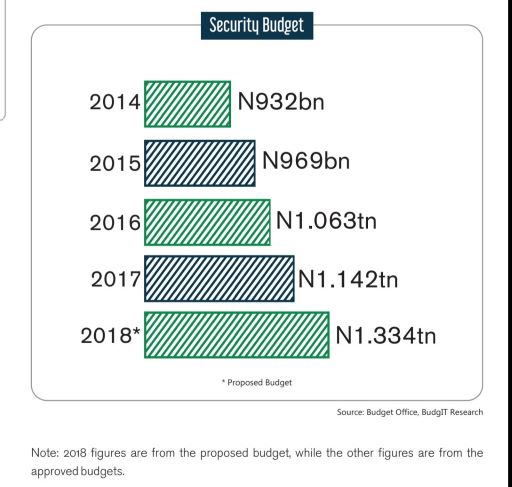
Consequently, it has become imperative to assess the effectiveness of past national security funding and consider governance reforms that may be required to cut waste, reduce the cost of governance and redirect scarce revenue and resources toward developmental needs. The late Ambassador Eloho Otobo, in a book he co-authored with Dr. Oseloka Obaza, titled: “Nigeria: Caught in the Whirlwind”, noted that “conversations have begun to emerge on the need to unravel what constitutes the defence budgets and security votes and the nature of its accountability”. It was based on this fact that Global Sentinel went to town to investigate and research the very sensitive and largely ignored cases of growing “commercial ventures” by the Nigerian military and its implications on the overall defence funding as well as the accountability in the security budget management. This also aligned with the provision of Chapter II Section 22 of the 1999 Constitution of Nigeria, which states that the media shall always…” uphold the responsibility and accountability of the government to the people; and …shall be a watchdog over the excesses of government and shall ensure that government delivers its promises to the people. The government on the other hand shall ensure that the press informs the people about its aims and actions.” Despite these provisions, however, there are notable constitutional gaps that have aided security personnel and institutions engaging in corrupt practices to evade scrutiny in budget allocation and spending-one of them being the much not talked about “welfare and commercial ventures”.
The welfare and commercial ventures of the armed forces
Global Sentinel was able to obtain a paper in 2021 by Gen. JD Bulus, titled: “Welfare and Commercial Ventures of the Nigerian Army ”, where he argued in favour of the military establishing welfare and commercial entities like most South Asian militaries. According to Bulus, some Asian and Middle East militaries have, through these schemes, developed homegrown welfare schemes and are now running lucrative commercial ventures that rival private businesses ‘. He noted that their welfare schemes and businesses are not only doing well but have contributed a commendable proportion to the Gross Domestic Product (GDP) of such nations. Some of the countries include Pakistan, Sri Lanka, Bangladesh, China, and India, to mention a few. “While some of the welfare schemes and commercial ventures are run by their armed forces, others are wholly owned by the Army. They have provided investment opportunities for their military personnel to own shares in them,” he added.
Also read: Containing the challenges of monitoring and tracking defence budget and spending in Nigeria
To this end, the senior officer stressed that the Nigerian Army established “numerous welfare schemes and business ventures to improve the welfare of personnel as well as generate revenue for the System ”, adding that the welfare and business ventures though still at their infant stage, are capable of providing massive investment opportunities for officers and men. Bulus listed some of these ventures including Nigerian Army Welfare Limited by Guarantee (NAWL/G), Directorate of Non-Public Funds (DNPF), Nigerian Army Properties Limited (NAPL) Group, Post-Service Housing Development Limited (PHDL), Command Guest House (CGH) Limited and Nigerian Army Drug Manufacturing Company (NADMACO) Limited amongst others.
He highlighted that there is a thin line between welfare schemes and commercial ventures otherwise known as Business Ventures, in terms of scope and objectives. Ordinarily, he said, Nigerian Army Business Ventures (NABVs) are set up for profit motives while welfare schemes are gratuitous in nature and outlook. Usually, entities that are set up for welfare purposes sell at a margin fairly above the cost of production or Break-Even Point (BEP). He listed some of the NAWS including the Nigerian Army Welfare Limited by Guarantee (NAWL/G), Nigerian Army Finance Corporation (NAFIC), Nigerian Army Welfare Insurance Scheme (NAWIS), Nigerian Army Benevolent Fund (NA BENFUND) and Directorate of Non-Public Funds (DNPF). Other welfare schemes include Nigerian Army Mammy Markets (NAMM), Nigerian Army Hospitals (NAH), and Command Secondary Schools (CSS) amongst others.
On the other hand, the paper said the establishment of NABV for profit making is still evolving as Nigerian Army is still working on its modalities to “ensure that they do not only provide welfare services to its personnel but is repositioned to generate IGR as their counterparts in other armies of the world”. These outfits include; Nigerian Army Properties Limited (NAPL) Group, Post-Service Housing Development Limited (PHDL), Command Guest House (CGH) Limited, and Nigerian Army Drug Manufacturing Company (NADMACO) Limited. Others are; Nigerian Army Farm and Ranches Limited (NAFARL), ST Foods Limited, Nigerian Army Vehicle Manufacturing Company (NAVMC), Nigerian Army Post Exchange (NAPEX) Supermarket, Nigerian Army Shopping Arena, and Central Engineering Depot (CED). Additional business ventures that were also established are; Nigerian Army Driving School (NADS), Nigerian Army Green Security (NAGS) Limited, Sappers Engineering Nigeria Limited (SENL), Nigerian Army Pronto Technical Company (NAPTC), Nigerian Army Ordnance Tailoring Factory (NAOTF) and Buffalo Engineering Technical Services Ltd (BETSL).
Even though Global Sentinel was not able to obtain further materials, it gathered that the same situation in the Army applies to other sister services of the Air Force and Navy as well as other security and intelligence agencies. But responding to inquiries, security expert and former Director of Information and Public Relations (DOPRI), Nigerian Air Force (NAF), Group Captain Sadeeq Shehu (rtd), disagreed with the justification for setting up these ventures. According to Shehu: “Every job has its global best practices. Global best practices as espoused by international agencies that are renowned for how the military should be run, especially in a democracy, is that military organization should not be involved in business”. He said the argument by some proponents of this venture is throwing Pakistan and the Middle East military into the mix. “Some even throw in China, of course, China does not even apply because they run a communist government. Military officers who are convicted for financial corruption are hanged,” he added while noting: “although every country has its peculiarities, the general acceptance is that the military should not be involved in business”.
Four main avenues
A military source confided to Global Sentinel the major avenues through which most of the commercial ventures are executed. He listed four key major revenue-generating commercial interests: education, hospitality, health centers, and real estate.
Hospitality: All the tri-services of Armed Forces of Nigeria (AFN), that is the Nigerian Army, Nigerian Air Force, and Nigerian Navy, all have one form of hospitality platform or the other including NAF Clubs and Command Guest Houses. However, there are downsides to this as explained by one Security Sector Reform (SSR) stakeholder. According to the expert, these military hospitality institutions that are now increasing in numbers could potentially run their private competitors out of business without necessarily contributing much to the economy in an accountable manner. “They can afford to charge their rooms and other services at highly subsidised rates far below the market value because it is the military officers and personnel who are being paid to work for Nigerians that are being taken there, to do guard duty, and other jobs”, the source said.
Education: The military services including the Defence Headquarters (DHQ) have also established various school platforms right from primary to tertiary institutions. There are today, Army, Naval, and Air Force Universities in addition to the Nigerian Defence Academy (NDA) and related institutions. Findings reveal that the concept of schools in the AFN like the Army Day Secondary schools, Airforce Secondary schools, Command Secondary or primary schools were to be situated between some 5-10 kilometers to the barracks. This is especially if the local communities of the base do not have a school. “So, in a situation like that, the Army can make a case for opening a primary or a secondary school purely to serve soldiers that are in that barracks, but it is also encouraged that 20- 30 percent allotments for the local community as part of Corporate Social Responsibility (CSR). But the expected practice is that if there is a government school there, they should not be permitted to open another school”, a senior military officer explained. But the reality today is this basic concept is not observed but abused with mushrooming of military schools purely for commercial purposes and some are even situated completely outside the base.
He continued: “I can tell you that after finance people, the other people that have money are within the education. Just like I told you about the hotels when you come to the education sector this is the same issue. For example, if you are the proprietor of a private school, you will have to pay for teachers, power, water, and everything from your pocket. On the other hand, the military builds and funds these schools with the government money yet gets free or subsidized services from personnel such as teachers, and guards and pays bills from budgeted funds. The implication is that if a private school proprietor charges, for example, N10,000 per pupil in your school, the military schools can comfortably charge N2,000 without blinking.”
Medical Centres: The same rules that guide the establishment of schools at bases also apply to hospitals. “Till I die, I will oppose why the Airforce went to open a specialist hospital in Daura. The same concept for school is the same concept for opening a medical unit, it is based on identified needs, based on how many officers, soldiers, and their families are in that area that doesn’t have healthcare. It is not to open it for making money but today that is what these medical centers are for,” a soldier said.
Real Estate: The military services are actively engaged in property business and real estate development. Even though the primary purpose of various housing schemes is to provide accommodation to their officers and personnel at subsidized rates, these are increasingly being built with civilians as potential buyers and at a profitable rate. The real estate schemes by the AFN have blossomed into money-making ventures.
Others: The military also operates other commercial ventures as revealed in the document from the Nigerian Army including catering and events management, private guards’ firms, Fuel stations, and engineering companies among others.
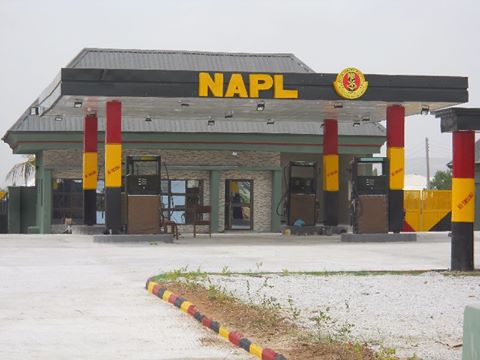
The imperative…
The essence of this seminal piece is to beam the searchlight on the funding and financial management of the commercial ventures by the Nigerian military because it is largely unaccounted for and hardly talked about yet they have a great consequential effect on national security, economy, and development. Even though the discussion about monitoring and tracking the defence budget has barely scratched the surface, it is, however, mostly focused on firstly, the funds allocated in the annual budget. Whereas further efforts by the media as well as the governmental and non-governmental anti-corruption agencies like Transparency International (TI) and its Nigerian affiliate, the Civil Society Legislative Advocacy Centre (CISLAC), are focused to unravel the extra and off-budgetary allocations like the controversial $1 billion ECA funds, the infamous security votes and much talked about $2.1 billion Dasukigate scandals; no one has bothered to find out the revenue churning and spinning commercial ventures by security agencies. Discussing them has becomes imperative for the following reasons:
Black hole: There is concern by some security experts and stakeholders that the growing penchant for the establishment of commercial ventures could be a black hole that sucks defence funding without a trace or accountability. This means that billions that could be plowed back into the economy, especially the defence and security sector are largely unaccounted for. A senior military officer who spoke to Global Sentinel on the condition of anonymity revealed that most of these ventures are built and sustained with government money yet it cannot be traced to any budgetary overhead. “What will astonish you is that if you take all the military budget, you will not see where they make provisions for running of NAF Club. The big question is where is the money coming from? This means they have a lot of loose money in the budget, they don’t put it on paper because if it appears that the military is budgeting money to run a hotel, people will start asking questions. It is not reflected in the budget but every year, they get money. It is a big question,” a security source stressed.
Off-Budget and unconstitutional: Alarming also is the fact that monies made from these ventures are never accounted for and remitted to the government coffers. These are off-budget earnings and expenditures and distort the overall defence budget allocation and procurement processes. This is also added to the fact that these ventures and money earned from them are outside the realm of legislative oversight, hence unconstitutional.
Robbing Peter to Pay Paul: This is like a case of stealing from the government or using the money allocated for other projects, programmes, and procurement purposes that are being rechanneled (sometimes illegally) to these ventures. The implication is that other aspects of defence and security suffer with regular complaints that the money is never enough for internal security operations.
Impacts on CTCOIN/Insecurity: One of the probables is that it could impact negatively on internal security operations, Counter-terrorism and Counter-insurgency (CT-COIN) operations by diverting and divesting the attention of the military from the core issues of national defence and security to money-making ventures.
Impacts on the Economy: There is an argument that this could also impact negatively on the economy as the highly (and illegally) subsidised military ventures ruin and run private competitors out of business. And since most of the earnings from these establishments are never remitted nor taxed, they eventually deduct from and distort the economy. According to a counter-terrorism expert, there is an economic and social problem attached to that. “So, in other countries that I have studied, the commercial venture is protected from these people. While the businessmen are hiring workers, they are taking government money and will run that man out of business. People mustn’t lose their jobs, and it’s also important to protect the hotel business. You cannot use government money to be subsidising rates while others cannot compete,” he said.
Copycat Effect: Since money is involved, which is largely unregulated, unaccounted for, and at the whims and caprices of military top brass, there is a danger of such practices being abused. Since every new service chief is at liberty to set up his legacy project, there is now a growing trend–a race to establish more commercial ventures by the service chiefs. The growing copycat effect could grow out of control.
State-within-a-state: The most prominent danger is the fear of the emergence of a military-industrial complex warned about by the 34th United States President, Dwight Eisenhower, that could be detrimental to national security itself. This is when a military grows so powerful that it becomes a state within a state as seen in the case of Egypt and Pakistan where this practice of commercial ventures is entrenched. The fear is that since the money is largely unaccounted and unregulated, the military could grow so rich and powerful that it can no longer be controlled by civil authority.
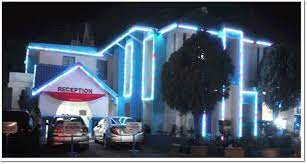
Security Chiefs as the accountants
Our investigation also revealed that the security chiefs are the top dogs when it comes to the overall funding and financial management of these entities.
A senior military officer who spoke to Global Sentinel on this issue, explained how it works, saying: “Another issue is that when it comes to accountability, there is no external accountability. In the military, because there is no external oversight, every financial decision rests solely on the decision of the Service Chief. The issue of promotion as well rests on the chief who decides who should be promoted or not, so it’s not based on merit.
“So, the issue is that business ventures are prevalent among military chiefs. They bring in their sycophants to fill up positions that are beneficial to them. That is not accountability, as they call themselves General Managers, MDs, GMs, etc. They give funny names to Generals in the military.”
He continued: “This is why we are having an excess of major generals. The “kudi-kudi” (meaning money-making offices) are only for major generals. Let me be honest with you; this is why some of the most crooked officers we see today are mainly major generals. You will be shocked that the US Armed Forces with over 1,000,000 in strength have just about 1,000 while the AFN with barely 200,000 personnel has almost 900 generals. So, you can imagine.”
But a former service chief, who spoke to Global Sentinel on the issue, did agree with Eisenhower on the need to be careful with the military-industrial complex but argued that every environment is unique to its own needs. According to him, there is a genuine rationale for setting the Nigerian military establishment the way it is including the welfare and commercial ventures. He noted that it’s wrong to compare Nigeria with advanced democracy as the country is still in the process of nation-building and should be allowed to grow through the process without being cajoled.
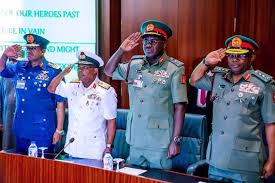
Silence or fear?
Unfortunately, other stakeholders contacted by Global Sentinel including military spokespersons, security experts, legislators, and members of Civil Society Organisations (CSOs) either refused to respond to our inquiries or lacked the requisite knowledge and information about the topic. Most of those that eventually spoke, did so under the condition of anonymity except few that agreed to be quoted. Accordingly, this medium reached out to the Director of Defence Information (DDI), Maj-Gen. Ohwonigho Akpor; Director of Army Public Relations (DAPR), Brig-Gen. Onyema Nwachukwu; Director of Information Navy (DINFO), Commodore Adedotun Ayo-Vaughan; and Director of Public Relations and Information (DOPRI), Air Commodore Edward Gabkwet, but received the silent treatment. But Ayo-Vaughan redirected us to a senior officer to speak on the matter but never responded.
Also contacted was the Chairman of the House Committee on Army, Hon. Abdulrazak Namdas; and another legislator with knowledge of the defence sector, Hon. Jimi Benson, could not respond to calls and messages sent to them. Other members of CSOs and security experts did not also respond to inquiries put forward to them, while those who responded explained a lack of knowledge on the subject. The posers sent to them was to know:
- How viable and profitable the ventures are
- How accountable are the military with the management of these ventures
- How can it be regulated and oversight
- Any other resources and recommendations
The investigation was to also “know the constitutional mandate of the ventures. What are the sources of funding for these ventures? How do they spend the money they make? Are they responsible for their funding? Do they have accountability mechanisms embedded within their organizational structure? If they do, how do the accountability instruments work, and how effective are they?”.
There were, however, some insights provided by Mr. Vahyala Kwaga, a Senior Research and Policy Analyst with BudgIT, who shared a document that gave a four-year insight into the nature of security budgeting and expenditure in Nigeria (2014-2018), none of which captured or factored-in the plethora of “welfare and commercial ventures”. The document, however, highlighted that “an increasing share of Nigeria’s security budget is being dedicated to the payment of salaries and emolument of its personnel. Capital expenditure–including investments in weapons systems, communication systems, logistics infrastructure, physical infrastructure, housing, among others–are decreasing relatively in comparison to the rest of the budget.”
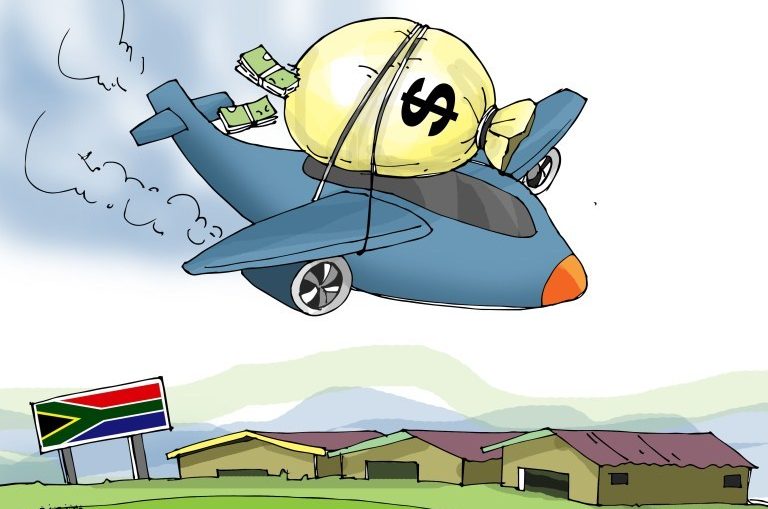
Challenges
In the course of this research, Global Sentinel discovered that there are key challenges militating against effective oversight of this sector.
Lack of legal backing: These ventures are not legislated upon and therefore, in the eyes of the law does not exist. Just like this proved to be the albatross of various corruption cases involving defence and security procurement, it makes it difficult to prosecute or hold anyone accountable. This is also added to the fact that the official information is protected through the Official Secret Act which prohibits the collection, possession, or dissemination of official information and state secrets
Lack of capacity for legislative oversight: One of the major impediments to effective tracking and monitoring of the defence budget is the general lack of capacity or even connivance on the part of the legislators to their oversight functions. Most times, these legislators lack basic knowledge of their roles to hold government officials including the security chiefs accountable for the use of public funds. In some cases, they either get intimidated or compromised to look the other way.
Lack of political will: Similar to the lack of the capacity for legislative oversight is also the absence of political will on the part of the Commander-In-Chief of the armed forces to hold the security chiefs accountable. Most times, the President and other arms of government are beholden to the security chiefs that they hardly monitor their activities or hold them accountable.
Esprit De Corps/military culture: Reporting issues of corruption within the defence and security sector is an enormous task because they often hide under the oath of secrecy in matters concerning defence budgeting and expenditures. The closeness of the security sector often allows the parties in power to easily abuse their positions in these sectors. Indeed, the ability to classify security budgets and funding provides an opportunity for various cases of abuse. In addition, organisational culture in the defence sector carries a considerable risk of solidarity among the officers and men to the extent of covering up the corrupt practices of colleagues, despite being aware of the case. More so, the defence sector stakeholders, particularly military forces, have a strong inclination towards secrecy. The military and other security and intelligence actors often try to limit the amount and quality of the information they release. Some part of military planning and activity is compromised if it becomes publicly available, which justifies a certain degree of confidentiality in some areas. However, secrecy requirements are often used as a pretext to hide unlawful activities like the establishment, earnings and management of the business platforms in the AFN.
Way forward
Reforms: If the issue of transparency and accountability is to be achieved in the security and defence sector, then it must be backed with aggressive and sustainable reforms of the sector including updating, repealing, and enforcement of some relevant laws. For example, the Freedom of Information Act has by its very nature of existence, repealed the often-cited “Official Secret Act”, but the reality is different. Similarly, efforts should be made to implement various recommendations by various defence and security sector reform committees.
Presidential declarations: As the number one Chief Security Officer the state and commander-in-chief of the armed forces, the president could abolish, nullify, repeal and reform some practices within the military that lack legislative backing with a just pronouncement or Executive Order. A member of one of the reform committees told Global Sentinel, that one of their key recommendations was to abolish these commercial ventures or at the barest ensure effective regulation, monitoring, and accountability. The source said: “There is no special law that says that the military should do business. They are only operating in the absence of nobody looking into them.
“So, this could be stopped today with an announcement directing the military not to do business, it is an instruction. The business is distracting them from their job. I have read some research that says apart from distracting the military from their primary duty, it is an abuse of a general’s rank, especially a combatant who is put in charge of managing a hotel. Do you know how many generals we have, we have over one thousand, too many generals, that’s why all the people conducting business in the army and navies are generals. It is bad, apart from affecting the work, there are socio-economic issues.”
Effective oversight: Similar to the presidential declaration, the legislators could be encouraged to ensure effective oversight of the sector. However, they cannot do this without the needed capacity. To this end, it is either the national assembly embarks on capacity building training, engages the services of experts and consultants or the political system is reformed in such a way that ensures those with the requisite experience, knowledge, and capacity are either elected into the legislative chambers or appointed into the committees and relevant Ministries, Departments and Agencies (MDAs).
Transparency and accountability with the AFN: Also, crucial is to create a mechanism that encourages internal transparency and accountability of the funding, financial management, and procurement process within the security and military services. This will also cascade down their various units and platforms including the welfare and commercial ventures.
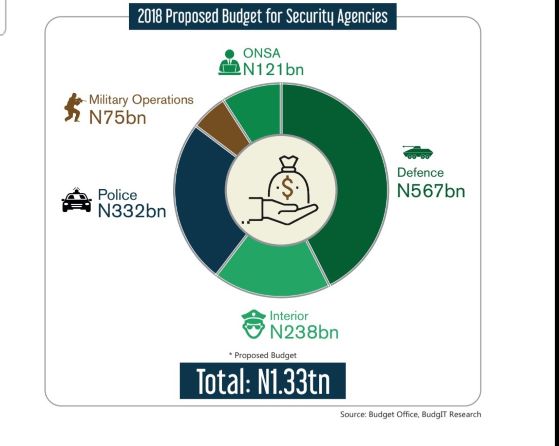
Conclusion
The security and defence sector are crucial to both the internal and external security of Nigeria as well as the overall development of the country and the well-being of its citizens. And because a lot of funds go into this critical sector, it became imperative that there is adequate monitoring of these funds of the armed forces to enable them to purchase modern military equipment to fight various security threats as enunciated by BudgIT in its four-year security sector analysis in 2018 including a threat to oil installations, Boko Haram, kidnappings, Niger Delta militancy, armed robbery, herdsmen-farmers clashes, cattle rustlers, pipeline vandalism, intertribal clashes, cultism, extortion and hooliganism, religious clashes and tensions, election violence, piracy and extrajudicial killing.
Monitoring and tracking of funds allocated to this sector have proved very difficult because of so many factors, chief amongst them being the opaque nature of defence and security sector. Nevertheless, spirited efforts are being made by the media in fulfillment of its watchdog role, which are also complimented by active inputs by the anti-graft agencies and CSOs like the BudgIT, TI, and CISLAC amongst others.
However, the focus of this research and investigation by Global Sentinel helped to show that while a lot of efforts are focused on tracking the legislated budgetary allocations to ensure accountability and transparency but most of the corruption cases are mostly from off-budget or extra-budgetary sources like the security votes and the controversial ECA $1 billion security fund. But more glaring gaps remain in the inability of the government, especially the legislators and other stakeholders to oversee the multi-billion naira “welfare and commercial ventures” of the Nigerian military.
The implication of the unregulated nature of this practice is however, lost on most Nigerians including its negative impact on the economy and its potential to jeopardise national security in the long run. As a solution, a senior military source suggested: “if today I become President or I become a minister and the government gives me power, I will transfer those universities from the place where they are. I will give them to the state government. It is another source of money not accounted for, so when we say business ventures, be thinking of schools, hotels, and medical centers”.

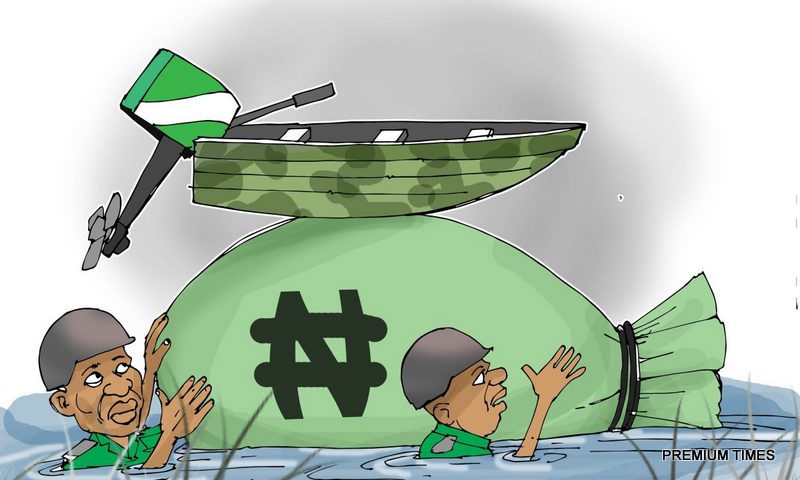
[…] Read also: Special Report: Tracking Nigerian military’s commercial ventures? […]